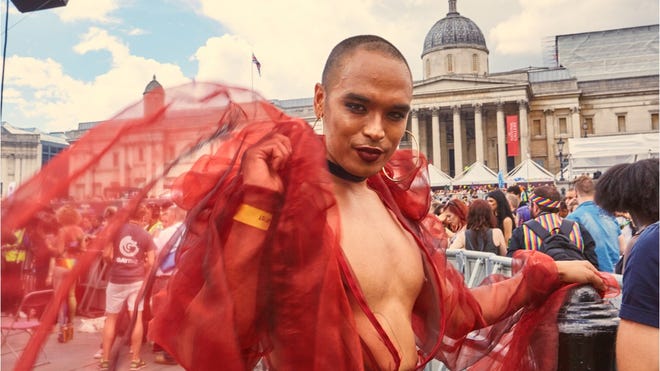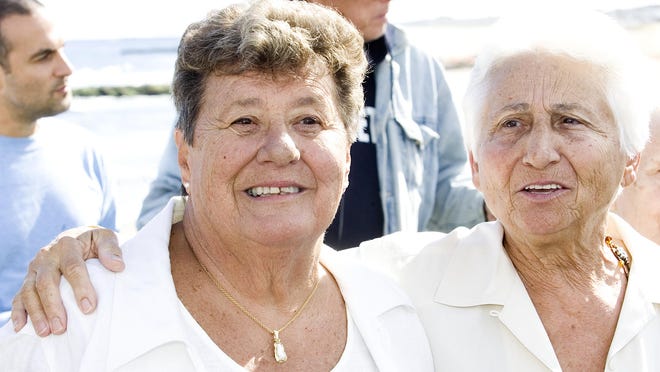
TRENTON – Just walking up to Arm & Hammer Park on June 12, it was clear there was a different vibe in the air.
The music outside of the Triple-A Trenton Thunder’s baseball home included Queen, Elton John and George Michael. Staffers wore special rainbow attire. Even the mascot, Boomer, donned a gay-friendly uniform.
Pride Night was on.

Trenton is one of two New Jersey minor league teams holding such events during June, which is Pride month. The Thunder and the Jersey Shore BlueClaws in Lakewood brought prideful game themes to New Jersey in 2019.
The Sussex County Miners and New Jersey Jackals of Montclair have so far skipped the idea, while the Somerset Patriots said they are hoping to plan something for later this season.
“It is great to promote the open mindedness we are supporters of,” said Gregg Caserta, Thunder media director. “Minor league baseball brings a lot of people under one umbrella.”
Feted: NJ destinations and events for LGBTQ folks, allies to celebrate Pride in 2021
But even as pride nights and LGBTQ rights are seeing a surge across many fields, openly gay professional athletes are still a rarity among the four major team sports.
For baseball, each of the 30 Major League teams averages 28 players, while the 120 minor league clubs usually hold about 30, according to league data.
That comes to more than 800 MLB players and about 3,600 minor league players, none of whom are openly gay.
Locker room should be ‘somewhere where people can be themselves’
“It is hard to say why,” said Chris Adamson, BlueClaws manager. “It is a little bit stigmatized and that is not ideal. It could be the fact that they are a little bit more intimidated by that, whether it is just the locker room environment. That is difficult to hear because you want your locker room to be somewhere where people can be themselves.”
Belicia Montgomery, director of diversity & inclusion for Minor League Baseball, said so much pressure is placed on players coming up through the ranks that many probably feel it would add more scrutiny, especially since there are so few open players, if they came out.
“A lot of it is that they do not want that to be their identity, they want to be judged being a player,” she said. “That is sometimes the case. What is the locker room culture really like? Especially on the minor league side.”
Some players I approached on several Garden State minor league teams were reluctant to speak on the record about the issue, while Caserta declined to allow access to Thunder team members fearing such inquiries would make them uncomfortable.
Celebrate: Long Branch queer artist showcase to boost Black transgender people
“I’m afraid I can’t have the guys talk about tonight. I wouldn’t want to put someone in an uncomfortable or awkward situation because I don’t know anything about their personal beliefs” he said via email. “I know on our side of the fence we can talk about these things openly but clubhouse culture is still different than what we’re used to. I hope you understand because I know you’re a good reporter and wouldn’t sandbag anyone, but I don’t want to create a possible negative situation for any of the players.”

But gay rights proponents among the minor league clubs say events like Pride Nights and related signs of acceptance and support may make players less timid about coming out.
Lakewood event drew praise – and sparked protests
“That is the whole purpose of days like this,” Adamson of the BlueClaws said the week of their Pride Night. “Hopefully for the players it might create more of an avenue.”
The BlueClaws drew support and praise in 2019 with its first pride event, which actually sparked some protests. But, in the end, the team received a Minor League Baseball Presidential Citation for standing up to opposition.
“We are committed to the idea that baseball is for everyone and all people are welcome at a BlueClaws game,” read a team statement at the time. “It is unfortunate that some individuals are choosing to display intolerance rather than embrace the true spirit of the night.”
The BlueClaws 2019 event was part of a nationwide pride campaign that year to promote and support LGBTQ fans and issues for the first time on a broad scale.
In 2019, there were events held by 69 of the then-160 minor league teams, according to Montgomery.
With a sharp reduction in teams during 2020, due in part to the pandemic and a new agreement with Major League Baseball, there are now just 120 teams, so fewer events are likely.
Still, Montgomery says the awareness and campaign for broader support continues.
“There is definitely no slowing down on pride nights as minor league teams are coming back from going a whole year without having games,” she explained. “The teams are off and running on their own. A team’s main activation may be participating in the pride parade in their hometown or they collaborate with a local non-profit. It is not always a game night.”
The feeling in Trenton on Pride Night showed acceptance was growing and at least a few fans showed up because of the special meaning.
“I think it’s wonderful,” said Patty Jackens of Yardville, Mercer County, who sported a rainbow shirt and brought her gay niece along. “I think it is nice they recognize LGBT issues and support them.”

Caserta, who said the music by gay artists was not a coincidence — noting Thunder Video Director Ben Wolverton, who is gay, chose the selections for that purpose. He added that there has been no public opposition to their event.
“There is no blowback,” he stressed. “And it is no different than any other game.”
Invidual sports, women’s teams have breakthroughs
Still, the lack of openly gay players in baseball, as well as football, hockey and men’s basketball shows the stigma remains. Other more individual sports such as tennis, golf and many women’s teams have broken through, according to Outsports, a website that covers LGBT issues and personalities in amateur and professional sports.
Outsports has a special section dubbed “Coming Out Stories” that chronicles when athletes decide to end their closeted ways. Recent examples range from the April 22 story on Missouri Western State University softball captain Emma Hoffart to the June 3 piece on gay triathlete Michael Lalli.
Then there is the story of Candace and Tig Archer, who met on the West Virginia University cross country team and were married in 2019. The duo penned an account of their story in April 2021, a month before they graduated.
“We choose to be visible because there are people that believe our marriage is not real, or that our love is fake,” they wrote in the Outsports piece. “We think when people see how kind we are to each other and how much we make each other happy, they have a very hard time hating us and what we stand for.”
Baseball ‘very slow to change’
But such openness has yet to transfer to the big four sports and, pride nights or not, it appears to be a slow road, observers say.
Reaction: Florida Gov. Ron DeSantis signs transgender athlete ban on first day of ‘Pride Month’
“Baseball as a general thing is very slow to change and has to be among the more conservative of sports,” said Ken Schultz, an Outsports contributor based in Chicago. “You also have to remember that baseball is always run by old white men and old white men are usually one of the last groups to change when it comes to an approach to civil rights.
“In addition to being a slow-moving sport, baseball is also part of conforming to a clubhouse culture,” he said. “That culture has to change. Baseball still draws a lot from the south, from small towns, from religious players.”
But, he added, “when it comes to players being public I think we are approaching a better place.”
He pointed to one positive example from history, former Los Angeles Dodger and Oakland Athletic Glenn Burke, who played four seasons from 1976 to 1979, including as a starting outfielder in the 1977 World Series.
“He was one of the most popular people on those Dodger teams of the 70s,” Schultz said of Burke, whose story was the basis of a great 2020 biography titled, Singled Out.
While the minor leagues are where a lot of change has often come first, most recently with some rules getting their first tryout there, Schultz believes the first self-outed player may have to be a proven superstar better able to handle the heat.
“Because major league clubhouses are so insular and have such a unique atmosphere I think it would be more influential if a star level player were to come out,” he said. “It would really be the signal to teams everywhere.”
But he agreed it won’t be easy no matter who is brave enough: “Once a gay player comes out, he’s going to have to be comfortable being scrutinized and be the focus of attention and answer the same questions at every town he visits.”
Looking back at Jackie Robinson’s historic color barrier success, many credit his abilities as a top player along with his courage for making him succeed: “It certainly would help if a player of Jackie Robinson’s caliber would come out,” Schutz said.
Joe Strupp is an award-winning journalist with 30 years’ experience who covers education and Monmouth County for APP.com and the Asbury Park Press. He is also a die-hard Yankees fan when not checking out the marvelous minor leagues.
